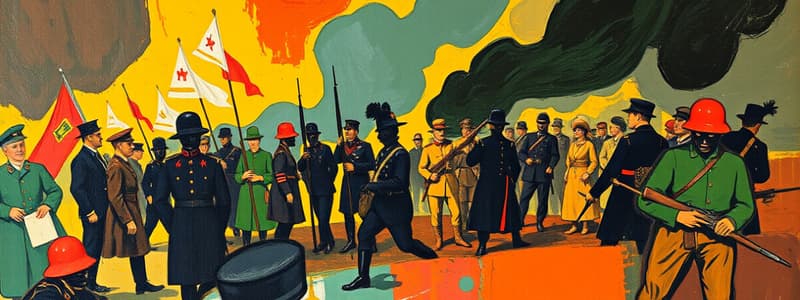Podcast
Questions and Answers
What are Liberty Bonds?
What are Liberty Bonds?
- A type of loan from the government to individuals
- Bonds that decrease in value over time
- Bonds bought to support the government during war (correct)
- Government aid for veterans
What was the Zimmerman Note?
What was the Zimmerman Note?
A secret communication from Germany to Mexico to encourage war against the U.S.
What does the term alliance refer to?
What does the term alliance refer to?
A team formed during the war.
What is an armistice?
What is an armistice?
What does self-determination mean?
What does self-determination mean?
What is mobilization?
What is mobilization?
What are reparations?
What are reparations?
What does stalemate mean?
What does stalemate mean?
Who are pacifists?
Who are pacifists?
What is the Selective Service Act?
What is the Selective Service Act?
What was the Great Migration?
What was the Great Migration?
What are Wilson's Fourteen Points?
What are Wilson's Fourteen Points?
What was the League of Nations?
What was the League of Nations?
What is the Treaty of Versailles?
What is the Treaty of Versailles?
What was the Allied Expeditionary Force?
What was the Allied Expeditionary Force?
What were the Espionage Acts?
What were the Espionage Acts?
What was the Sedition Act?
What was the Sedition Act?
What was the Sussex Pledge?
What was the Sussex Pledge?
What are U-boats?
What are U-boats?
Who were the Big Four?
Who were the Big Four?
Who are internationalists?
Who are internationalists?
Who were the Reservationists?
Who were the Reservationists?
What does irreconcilable mean?
What does irreconcilable mean?
What was the 369th Regiment?
What was the 369th Regiment?
Flashcards are hidden until you start studying
Study Notes
Liberty Bonds
- Citizens purchased liberty bonds to provide immediate funds for the government during wartime, earning interest over time.
Zimmerman Note
- In 1917, Germany sent a message to Mexico encouraging it to join the war against the U.S. This note was intercepted, leading to U.S. mobilization against Germany.
Alliance
- An alliance is a coalition formed by countries or parties to support each other during a war.
Armistice
- An armistice refers to an agreement between warring parties to cease hostilities.
Self-Determination
- The principle of self-determination allows ethnic groups the right to govern themselves independently.
Mobilization
- Mobilization involves assembling troops and logistics to prepare a nation for warfare.
Reparations
- Reparations are payments made to compensate for damages caused during warfare.
Stalemate
- A stalemate occurs when no progress is made in a conflict, preventing any advancement by either side.
Pacifists
- Pacifists are individuals who oppose violence and advocate for peaceful resolutions.
Selective Service Act
- Enacted in 1917, the Selective Service Act required males aged 21 to 30 to register for military draft.
Great Migration
- Between 1914 and 1920, over 300,000 African Americans migrated from the rural Southern U.S. to Northern cities seeking better opportunities.
Wilson's Fourteen Points
- Outlined by President Wilson in 1918, the Fourteen Points proposed self-determination, freedom of seas, free trade, reduction of arms, and the establishment of a League of Nations.
League of Nations
- The League of Nations was founded post-World War I to promote international cooperation and prevent future conflicts.
Treaty of Versailles
- The Treaty of Versailles, imposed on Germany in 1920, demanded heavy reparations and included territorial losses for Germany.
Allied Expeditionary Force
- Commanded by General Eisenhower, the Allied Expeditionary Force achieved a significant victory by storming Normandy, France.
Espionage Acts
- Enacted in 1917 and 1918, these laws penalized those who interfered with or criticized U.S. involvement in World War I.
Sedition Act
- The 1918 Sedition Act made it illegal to publicly criticize the government during wartime.
Sussex Pledge
- The Sussex Pledge was Germany's promise to the U.S. to stop unrestricted submarine warfare after threats from President Wilson.
U-boats
- U-boats are German submarines used in warfare to target enemy ships.
Big Four
- The Big Four at the Paris Peace Conference included Woodrow Wilson (USA), David Lloyd George (UK), George Clemenceau (France), and Vittorio Orlando (Italy).
Internationalists
- Internationalists believe the U.S. should be active in promoting global peace, in contrast to isolationist views.
Reservationists
- Led by Henry Cabot Lodge, Reservationists were senators willing to approve the Treaty of Versailles if amendments were made.
Irreconcilable
- Irreconcilables are those who cannot come to a compromise or agreement, particularly regarding the Treaty of Versailles.
369th Regiment
- The 369th Regiment was an African American unit in the U.S. Army during World War I, recognized for its valor.
Studying That Suits You
Use AI to generate personalized quizzes and flashcards to suit your learning preferences.



